Northern Passage: American Vietnam War Resisters in Canada » książka
Northern Passage: American Vietnam War Resisters in Canada
ISBN-13: 9780674004719 / Angielski / Twarda / 2001 / 288 str.
More than 50,000 draft-age American men and women migrated to Canada during the Vietnam War, the largest political exodus from the United States since the American Revolution. How are we to understand this migration three decades later? Was their action simply a marginal, highly individualized spin-off of the American antiwar movement, or did it have its own lasting collective meaning? John Hagan, himself a member of the exodus, searched declassified government files, consulted previously unopened resistance organization archives and contemporary oral histories, and interviewed American war resisters settled in Toronto to learn how they made the momentous decision. Canadian immigration officials at first blocked the entry of some resisters; then, under pressure from Canadian church and civil liberties groups, they fully opened the border, providing these Americans with the legal opportunity to oppose the Vietnam draft and military mobilization while beginning new lives in Canada. It was a turning point for Canada as well, an assertion of sovereignty in its post-World War II relationship with the United States.











